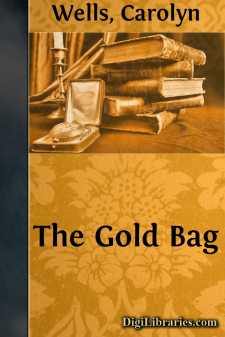Categories
- Antiques & Collectibles 13
- Architecture 36
- Art 48
- Bibles 22
- Biography & Autobiography 813
- Body, Mind & Spirit 142
- Business & Economics 28
- Children's Books 17
- Children's Fiction 14
- Computers 4
- Cooking 94
- Crafts & Hobbies 4
- Drama 346
- Education 46
- Family & Relationships 57
- Fiction 11829
- Games 19
- Gardening 17
- Health & Fitness 34
- History 1377
- House & Home 1
- Humor 147
- Juvenile Fiction 1873
- Juvenile Nonfiction 202
- Language Arts & Disciplines 88
- Law 16
- Literary Collections 686
- Literary Criticism 179
- Mathematics 13
- Medical 41
- Music 40
- Nature 179
- Non-Classifiable 1768
- Performing Arts 7
- Periodicals 1453
- Philosophy 64
- Photography 2
- Poetry 896
- Political Science 203
- Psychology 42
- Reference 154
- Religion 513
- Science 126
- Self-Help 84
- Social Science 81
- Sports & Recreation 34
- Study Aids 3
- Technology & Engineering 59
- Transportation 23
- Travel 463
- True Crime 29
The Gold Bag
by: Carolyn Wells
Categories:
Description:
Excerpt
I. THE CRIME IN WEST SEDGWICK
Though a young detective, I am not entirely an inexperienced one, and I have several fairly successful investigations to my credit on the records of the Central Office.
The Chief said to me one day: "Burroughs, if there's a mystery to be unravelled; I'd rather put it in your hands than to trust it to any other man on the force.
"Because," he went on, "you go about it scientifically, and you never jump at conclusions, or accept them, until they're indubitably warranted."
I declared myself duly grateful for the Chief's kind words, but I was secretly a bit chagrined. A detective's ambition is to be, considered capable of jumping at conclusions, only the conclusions must always prove to be correct ones.
But though I am an earnest and painstaking worker, though my habits are methodical and systematic, and though I am indefatigably patient and persevering, I can never make those brilliant deductions from seemingly unimportant clues that Fleming Stone can. He holds that it is nothing but observation and logical inference, but to me it is little short of clairvoyance.
The smallest detail in the way of evidence immediately connotes in his mind some important fact that is indisputable, but which would never have occurred to me. I suppose this is largely a natural bent of his brain, for I have not yet been able to achieve it, either by study or experience.
Of course I can deduce some facts, and my colleagues often say I am rather clever at it, but they don't know Fleming Stone as well as I do, and don't realize that by comparison with his talent mine is insignificant.
And so, it is both by way of entertainment, and in hope of learning from him, that I am with him whenever possible, and often ask him to "deduce" for me, even at risk of boring him, as, unless he is in the right mood, my requests sometimes do.
I met him accidentally one morning when we both chanced to go into a basement of the Metropolis Hotel in New York to have our shoes shined.
It was about half-past nine, and as I like to get to my office by ten o'clock, I looked forward to a pleasant half-hour's chat with him. While waiting our turn to get a chair, we stood talking, and, seeing a pair of shoes standing on a table, evidently there to be cleaned, I said banteringly:
"Now, I suppose, Stone, from looking at those shoes, you can deduce all there is to know about the owner of them."
I remember that Sherlock Holmes wrote once, "From a drop of water, a logician could infer the possibility of an Atlantic or a Niagara without having seen or heard of one or the other," but when I heard Fleming Stone's reply to my half-laughing challenge, I felt that he had outdone the mythical logician. With a mild twinkle in his eye, but with a perfectly grave face, he said slowly,
"Those shoes belong to a young man, five feet eight inches high. He does not live in New York, but is here to visit his sweetheart. She lives in Brooklyn, is five feet nine inches tall, and is deaf in her left ear. They went to the theatre last night, and neither was in evening dress."
"Oh, pshaw!" said I, "as you are acquainted with this man, and know how he spent last evening, your relation of the story doesn't interest me."
"I don't know him," Stone returned; "I've no idea what his name is, I've never seen him, and except what I can read from these shoes I know nothing about him."
I stared at him incredulously, as I always did when confronted by his astonishing "deductions," and simply said,
"Tell this little Missourian all about it."
"It did sound well, reeled off like that, didn't it?" he observed, chuckling more at my air of eager curiosity than at his own achievement....












